般将来时的时间状语
一般将来时时态用法讲解

⼀般将来时时态⽤法讲解⼀般将来时时态1. ⼀般将来时的定义⼀般将来时表⽰在现在看来即将要发⽣的动作或存在的状态。
常⽤时间副词tomorrow, soon或短语next year / week / month, in a few days, in the future, sometime 做状语。
如:What will you do this afternoon?你今天下午⼲什么?We will have a meeting tomorrow. 我们明天要开会。
He is going to study abroad(到国外) next year. 明年他要出国学习。
2. ⼀般将来时的结构及应⽤(1) shall / will + 动词原形。
表⽰即将发⽣的动作或存在的状态。
特别是表⽰客观性的事情或在某条件下要发⽣的事情,只能⽤此结构。
如:What shall we do if he doesn’t come 如果他不来,我们该怎么办?Will you be free this evening 今天晚上有空吗?I think he will tell us the truth(真相)。
我想他会告诉我们真实情况的。
(2) be going to + 动词原形。
表⽰已经计划或安排好了的事情,也可表⽰有迹象表明肯定要发⽣的事情。
如:We are going to have a meeting to discuss (讨论)the matter this evening. 今天晚上开会讨论这件事情。
Look at the black clouds over there. I think it is going to rain soon. 看⼀看那边的乌云,我想天要下⾬了。
There is going to be an English evening this week. 本周要举⾏⼀个英语晚会。
(3) be +现在分词。
一般将来时态

一般将来时讲解一、概念:表示将要发生的动作或存在的状态及打算、计划或准备做某事。
二、时间状语(标志词):tomorrow, next (day,week, month, year…),the day after tomorrow(后天)in ten years 等。
三、基本结构:1.主+be going to + do; 2.主+will+ do.四、区别be going to:(1)表示事先经过考虑、安排好打算要做的事情。
E.g What are you going to do today? 今天你们打算做什么?(2)表示根据目前某种迹象判断,某事非常有可能发生。
Look! There come the dark clouds. It is going to rain.will:(1)表示单纯的未来,将要做的事Eg:I will go home tomorrow.(2)表示不以人的意志为转移的自然发展的未来的事。
He will be thirty years old this time next year.(3)will还可表意愿。
问对方是否愿意做某事或表示客气地邀请或命令。
eg:Will you please turn on the radio?Will you go to the zoo with me?四、否定句:1.主+be(am, is, are)not going to do; 2.主+will not(won’t) do 如:It will not rain.I am not going to go shopping tomorrow.四、疑问句: be或will提到句首 ,第一二人称互换。
(1)一般疑问句:will+主+do/be(am,is,are)+主+going+to doEg:Will you do ……Will there be……(2)特殊疑问句:特殊疑问词+一般疑问句Eg:what are you going to do?**if从句与将来时态的联系:主句用一般现在时态,if从句用一般将来时态。
一般将来时
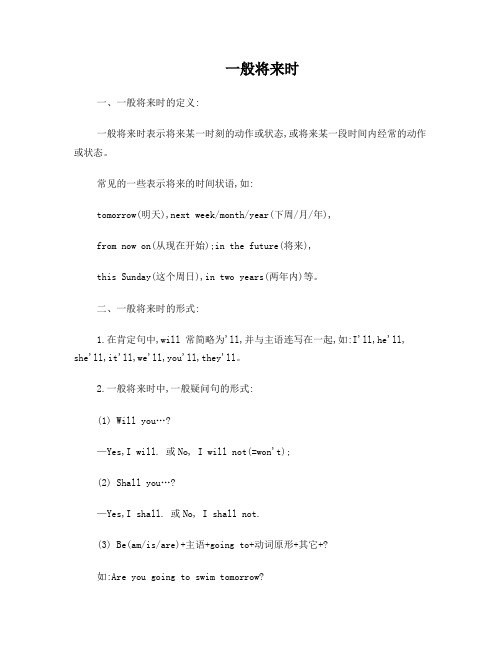
一般将来时一、一般将来时的定义:一般将来时表示将来某一时刻的动作或状态,或将来某一段时间内经常的动作或状态。
常见的一些表示将来的时间状语,如:tomorrow(明天),next week/month/year(下周/月/年),from now on(从现在开始);in the future(将来),this Sunday(这个周日),in two years(两年内)等。
二、一般将来时的形式:1.在肯定句中,will 常简略为'll,并与主语连写在一起,如:I'll,he'll, she'll,it'll,we'll,you'll,they'll。
2.一般将来时中,一般疑问句的形式:(1) Will you…?—Yes,I will. 或No, I will not(=won't);(2) Shall you…?—Yes,I shall. 或No, I shall not.(3) Be(am/is/are)+主语+going to+动词原形+其它+?如:Are you going to swim tomorrow?—Yes, I am./ No, I'm not.Is he/she going to play football next weekend?—Yes, he/she is./ No, he/she isn't.Are they going to go shopping this Sunday?—yes, they are./ No, they aren't.三、一般将来时的用法:1.一般将来时由“助动词shall(用于第一人称),或者will(用于第一、二、三人称)+动词原形”构成。
这种将来意义常常夹杂着情态意义即带有说话人的主观态度和看法,比如表示“预见”。
有时也含有“意愿”或“意图”的意思。
一般将来时的五种表达方法
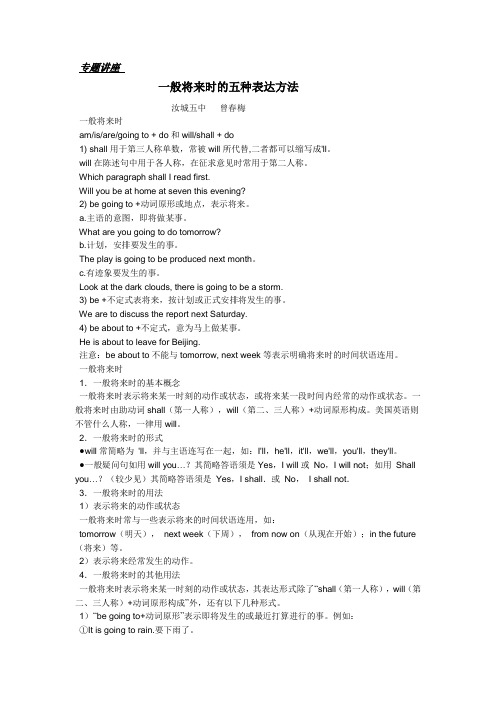
专题讲座一般将来时的五种表达方法汝城五中曾春梅一般将来时am/is/are/going to + do和will/shall + do1) shall用于第三人称单数,常被will所代替,二者都可以缩写成'll。
will在陈述句中用于各人称,在征求意见时常用于第二人称。
Which paragraph shall I read first.Will you be at home at seven this evening?2) be going to +动词原形或地点,表示将来。
a.主语的意图,即将做某事。
What are you going to do tomorrow?b.计划,安排要发生的事。
The play is going to be produced next month。
c.有迹象要发生的事。
Look at the dark clouds, there is going to be a storm.3) be +不定式表将来,按计划或正式安排将发生的事。
We are to discuss the report next Saturday.4) be about to +不定式,意为马上做某事。
He is about to leave for Beijing.注意:be about to不能与tomorrow, next week等表示明确将来时的时间状语连用。
一般将来时1.一般将来时的基本概念一般将来时表示将来某一时刻的动作或状态,或将来某一段时间内经常的动作或状态。
一般将来时由助动词shall(第一人称),will(第二、三人称)+动词原形构成。
美国英语则不管什么人称,一律用will。
2.一般将来时的形式●will常简略为'll,并与主语连写在一起,如:I'll,he'll,it'll,we'll,you'll,they'll。
一般将来时 时间状语 later

一般将来时时间状语 later一般将来时,是时间概念中的一种时态,在中文语境中常常用时间状语 later 来加以确定。
在英语中,一般将来时表示将来某个时间要发生的动作或存在的状态,而 later 作为时间状语,用来具体说明这个将来的时间。
在学习一般将来时时,我们通常会注意以下几点。
首先是一般将来时的构成:主语 + will/shall + 动词原形。
其次是一般将来时的用法:表示将来的某个时间要发生的动作或存在的状态。
再次是时间状语的运用,如 later 就是其中一个常见的时间状语。
通过对这些内容的理解,我们可以更深入地掌握一般将来时的用法以及时间状语的作用。
对于一般将来时的构成,我们需要注意主语与 will 或 shall 之间的搭配,以及动词原形的使用。
在构成句子时,我们需要确保主语和谓语动词的一致性,同时也要注意将来时态的助动词will 或shall 的使用。
在句子 "I will travel to London later." 中,主语 I 搭配 will,动词travel 使用原形,符合一般将来时的构成规则。
另外,一般将来时的用法是用来表示将来某个时间要发生的动作或存在的状态。
这意味着当我们需要表达将来的某个时间点或一段时间内会发生的事情时,就可以运用一般将来时。
“I will finish my homework later.” 这句话中,表达了某个时间点之后会完成作业的动作,符合一般将来时的用法。
我们要关注时间状语的运用,其中 later 就是一个常见的时间状语。
时间状语用来说明动作发生的时间,而 later 则表示在未来的某个时间之后。
在句子中使用 later 可以帮助我们更具体地确定动作发生的时间,加强语句的时态和语境。
一般将来时和时间状语 later 的结合运用,可以让我们更准确、清晰地表达将来的动作或状态。
通过对一般将来时的构成、用法和时间状语的理解,我们可以更好地运用这一时态,丰富语言表达的维度,使句子更具有深度和广度。
一般将来时讲解(附习题+答案)

一般将来时讲解(附习题+答案)一、一般将来时的含义:表示动作发生在将来二、一般将来时的句型:(1) will/shall+动词原形(2) be going to+动词原形三、一般将来时的时间状语:tomorrow(明天)、the day after tomorrow(后天)、next...(下一...): next week(下一周)、next year(明年)、next month(下个月)in+一段时间(...之后): in three days(三天之后)、in the future在未来this evening(今天晚上)四、一般将来时的句型结构:(1) will/shall+动词原形(will not =won’t)(will 各种人称均可用,shall 只能用于第一人称)1)肯定句:主语+will/shall+动词原型...如:I will go to school tomorrow.我明天将会去学校He will go to school tomorrow.他明天将会去学校。
2)否定句:主语+will/shall+not+动词原型...如:I won’t go to school tomorrow.我明天将不会去学校。
He won’t go to school tomorrow.他明天将不会去学校。
3)一般疑问句:Will/Shall +主语+动词原型...如:Will you go to school tomorrow?你明天要去学校吗?Will he go to school tomorrow?他明天要去学校吗?肯定回答:Yes, 主语+will.如:Yes, I will.Yes, he will.否定回答:No,主语+will+not.如:No, I won’t.No, he won’t.4) 特殊疑问句:特殊疑问词+will/shall+主语+动词原型...如:What will you do tomorrow?你明天将会做什么?What will he do tomorrow?他明天将会做什么?(2) be going to+动词原形1)肯定句:主语+be going to +动词原型...如:I am going to buy some books tomorrow.我明天打算去买一些书。
六种常用一般将来时表示法
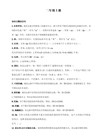
——No, he will not.不,他不会。
注意:在书面语中,主语是第一人称I(We)时,常用shall,即I(We)+shall+动词原形,也可用will。
例如:Shall we have any class tomorrow?明天我们有课吗?
——Yes,we will(we shall).是的,我们明天有课。
10. She_____(have)a concert the next year.
Keys:1、will…arrive 2、will be 3、am going to buy 4、are to 5、will not take
6、has, will go 7、come 8、returns, will let 9、will send, are 10、will have
一、常用表示法:
1、be going to+动词原形
表示将要发生的事,或打算、计划、决定要做的事情时,其肯定式:主语 + be + gong to do ;
疑问式:be + 主语 + gong to do ;否定式:主语 + be + gong to do。其中:be(am/is/are) 随主语人称而变化。
将来时的几种表达方式

一般将来时的几种表达方式一般将来时表示将来某个时间要发生的动作或存在的状态,也表示将来经常或反复发生的动作,常与表示将来的时间状语连用。
例如:tomorrow , tomorrow morning / afternoon …, the day after tomorrow , next year , next month …, from now on (从现在开始),in an hour (一小时后),in two days / weeks …等。
一般将来时的表示方法有以下多种形式:1. will / shall(1) will/shall do表示将来时间时,一般要与表示将来的时间状语连用,或通过一定的上下文来体现将来时间状语。
s hall只用于第一人称,will可以通用于各种人称。
在问句中shall常用于第一人称表示建议或征求对方意见。
例如:A. I shall write you a letter next month .我下个月给你写信。
B. He will come.他会来。
C. Shall we go to the park ?我们去公园好吗?注意:在You and I…或Both of us之后通常用will而不用shall,例:Both of us will be at the meeting tomorrow.明天我们俩都会出席会议。
(2) will/shall be doing因为在will/shall do中的will/shall也可理解为情态动词,所以有时会难区分它们是将来意义还是情态意义。
在英语口语中我们常用will/shall be doing来表示“单纯的”将来时间。
比较下列句子:I will come tomorrow.Will you come?我明天来!你来吗?(will表示意图和请求)I will be coming tomorrow.Will you be coming?我明天来,你来吗?(will在句中单纯表示将来)这一结构还表示不久或势必要发生的动作,例:The train will be arriving soon.火车很快就到站了。
一般将来时的定义、结构、例句、用法
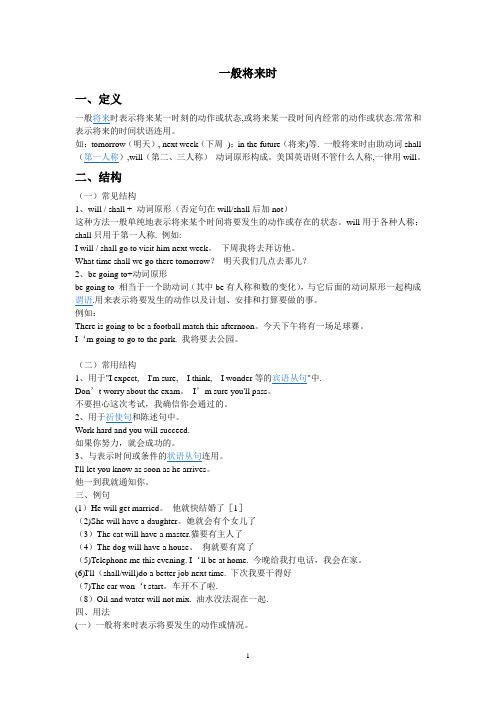
一般将来时一、定义一般将来时表示将来某一时刻的动作或状态,或将来某一段时间内经常的动作或状态.常常和表示将来的时间状语连用。
如:tomorrow(明天), next week(下周);in the future(将来)等. 一般将来时由助动词shall (第一人称),will(第二、三人称)动词原形构成。
美国英语则不管什么人称,一律用will。
二、结构(一)常见结构1、will / shall + 动词原形(否定句在will/shall后加not)这种方法一般单纯地表示将来某个时间将要发生的动作或存在的状态。
will用于各种人称;shall只用于第一人称. 例如:I will / shall go to visit him next week。
下周我将去拜访他。
What time shall we go there tomorrow?明天我们几点去那儿?2、be going to+动词原形be going to 相当于一个助动词(其中be有人称和数的变化),与它后面的动词原形一起构成谓语.用来表示将要发生的动作以及计划、安排和打算要做的事。
例如:There is going to be a football match this afternoon。
今天下午将有一场足球赛。
I‘m going to go to the park. 我将要去公园。
(二)常用结构1、用于"I expect, I'm sure, I think, I wonder等的宾语从句"中.Don’t worry about the exam。
I’m sure you'll pass。
不要担心这次考试,我确信你会通过的。
2、用于祈使句和陈述句中。
Work hard and you will succeed.如果你努力,就会成功的。
3、与表示时间或条件的状语从句连用。
I'll let you know as soon as he arrives。
一般将来时的用法与基本句型

一般将来时的用法与基本句型一般将来时表示将来某一时刻的动作或状态,或将来某一段时间内经常性的动作或状态,那么你知道如何去使用呢?以下是由店铺整理关于一般将来时的用法的内容,希望大家喜欢!一般将来时的用法一、一般将来时的定义用于表示将来某一时刻的动作或状态,或将来某一段时间内经常的动作或状态。
常常和表示将来的时间状语连用,如:tomorrow, next week, in the future等。
(will常简略为'll,并与主语连写在一起,如:I'll, she'll, he'll, it'll, we'll, you'll, they'll)二、一般将来时的构成1. will/shall+动词原形”Iwill/shall go to visit him next week.下周我将去拜访他。
2. be going to+动词原形Thereis going to be a football match this afternoon.今天下午将有一场足球比赛。
Iam going to go to the park.我将要去公园。
三、一般将来时的应用1. 肯定句主语+will+动词原形+其他,如:Theywill have a test next time.下次他们将有一次测试。
He will get married.他就快结婚了。
主语+will not +动词原形+其他,如:Shewill not be an engineer.她不会成为一位工程师。
3. 一般疑问句Will+主语+动词原形+其他+?,回答时使用yes/no. 如:Willhe live in New York in 10 years?他会在纽约住10年吗?Yes,he will.是的,他会。
4. 特殊疑问句特殊疑问词+will+主语+动词原形+其他+?.如:Why will you be here on Sunday?周日你为什么会在这儿?I will have a meeting on Sunday.我将要在周日举行一个聚会。
一般将来时讲解+练习题
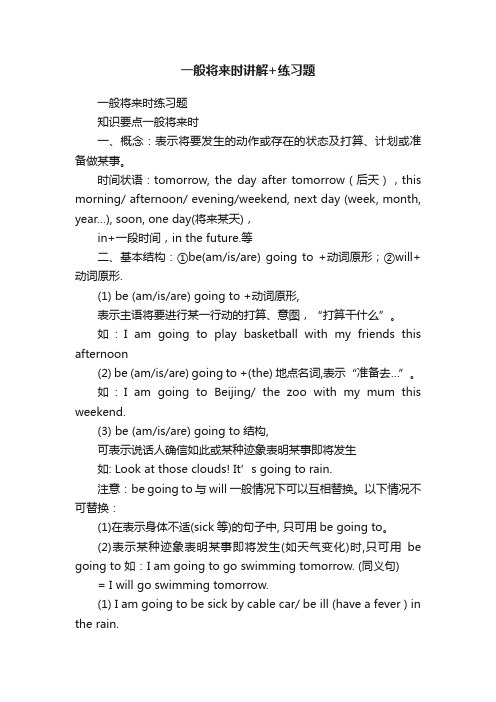
一般将来时讲解+练习题一般将来时练习题知识要点一般将来时一、概念:表示将要发生的动作或存在的状态及打算、计划或准备做某事。
时间状语:tomorrow, the day after tomorrow(后天),this morning/ afternoon/ evening/weekend, next day (week, month, year…), soon, one day(将来某天),in+一段时间,in the future.等二、基本结构:①be(am/is/are) going to +动词原形;②will+ 动词原形.(1) be (am/is/are) going to +动词原形,表示主语将要进行某一行动的打算、意图,“打算干什么”。
如:I am going to play basketball with my friends this afternoon(2) be (am/is/are) going to +(the) 地点名词,表示“准备去…”。
如:I am going to Beijing/ the zoo with my mum this weekend.(3) be (am/is/are) going to 结构,可表示说话人确信如此或某种迹象表明某事即将发生如: Look at those clouds! It’s going to rain.注意:be going to 与will一般情况下可以互相替换。
以下情况不可替换:(1)在表示身体不适(sick等)的句子中, 只可用be going to。
(2)表示某种迹象表明某事即将发生(如天气变化)时,只可用be going to 如:I am going to go swimming tomorrow. (同义句) = I will go swimming tomorrow.(1) I am going to be sick by cable car/ be ill (have a fever ) in the rain.(2) Look at those clouds! It’s going to rain.三、一般将来时的句型变化:1.肯定句:主语+ be(am/is/are) going to +动词原形或主语+ will + 动词原形. +动词原形否定句: (1)在be动词(am, is, are)后加not (2)情态动词will后加not成won’t. Eg:I’m going to have a picnic this afternoon.→ I’m not going to…..I will have a picnic this afternoon. → I will not (won’t) …2.2.一般疑问句:一调二改三问号(1)be或will调到句首(2)第一二人称互换:I/we – you;and改为or(否定与疑问句);some改为any;例如:We are going to buy some food and fruit this weekend. 或We will buy some…Are you going to buy any food or fruit this weekend? 或Will you buy any…? 3.特殊疑问句:who, what, where, when, how等特殊疑问词。
一般将来时 be going to do

一般将来时: be going to do sth.be going to句型的两种不同用法1)I’m going to the school.我正要去学校。
(come, go,arrive, leave等表位移、趋向动词的用现在进行时表将来。
)2)I’m going to go to the school.我打算去学校。
(be going to do sth.)一、概念:表示将要发生的动作或存在的状态及打算、计划或准备做某事。
句中一般有以下时间状语:tomorrow, next day\week\month\ year…, soon, the day after tomorrow(后天)等。
二、基本结构:1)肯定句:sb. be going to + do;I’m going to have a picnic this weekend.2)否定句:sb. be not going to do; ________________________________________________3)一般疑问句:Be sb. going to do----? ___________________________________________some改为any, and改为or,第一二人称互换4) 特殊疑问句:疑问词+be +sb. going to do-----?_______________________________?(口诀:疑问词在句首,系动词be跟着走,主语、going紧相随,其它成分不要丢。
)eg: We are going to have a meeting next Monday.我们什么时候开会?_____________________________________________________?谁下周一开会?_________________________________________________________?下周一我们要做什么______________________________________________________? 三、ExercisesPart1:单项选择。
一般将来时will结构讲解
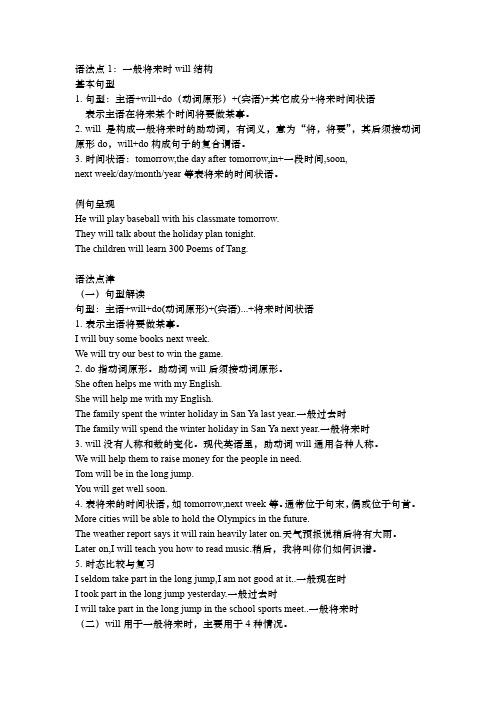
语法点1:一般将来时will结构基本句型1.句型:主语+will+do(动词原形)+(宾语)+其它成分+将来时间状语表示主语在将来某个时间将要做某事。
2.will是构成一般将来时的助动词,有词义,意为“将,将要”,其后须接动词原形do,will+do构成句子的复合谓语。
3.时间状语:tomorrow,the day after tomorrow,in+一段时间,soon,next week/day/month/year等表将来的时间状语。
例句呈现He will play baseball with his classmate tomorrow.They will talk about the holiday plan tonight.The children will learn 300 Poems of Tang.语法点津(一)句型解读句型:主语+will+do(动词原形)+(宾语)...+将来时间状语1.表示主语将要做某事。
I will buy some books next week.We will try our best to win the game.2.do指动词原形。
助动词will后须接动词原形。
She often helps me with my English.She will help me with my English.The family spent the winter holiday in San Ya last year.一般过去时The family will spend the winter holiday in San Ya next year.一般将来时3.will没有人称和数的变化。
现代英语里,助动词will通用各种人称。
We will help them to raise money for the people in need.Tom will be in the long jump.You will get well soon.4.表将来的时间状语,如tomorrow,next week等。
般将来时时态用法讲解

一般将来时时态1. 一般将来时的定义一般将来时表示在现在看来即将要发生的动作或存在的状态。
常用时间副词tomorrow, soon 或短语next year / week / month, in a few days, in the future, sometime 做状语。
如:What will you do this afternoon 你今天下午干什么?We will have a meeting tomorrow. 我们明天要开会。
He is going to study abroad(到国外) next year. 明年他要出国学习。
2. 一般将来时的结构及应用(1) shall / will + 动词原形。
表示即将发生的动作或存在的状态。
特别是表示客观性的事情或在某条件下要发生的事情,只能用此结构。
如:What shall we do if he doesn’t come 如果他不来,我们该怎么办?Will you be free this evening 今天晚上有空吗?I think he will tell us the truth(真相)。
我想他会告诉我们真实情况的。
(2) be going to + 动词原形。
表示已经计划或安排好了的事情,也可表示有迹象表明肯定要发生的事情。
如:We are going to have a meeting to discuss (讨论)the matter this evening. 今天晚上开会讨论这件事情。
Look at the black clouds over there. I think it is going to rain soon. 看一看那边的乌云,我想天要下雨了。
There is going to be an English evening this week. 本周要举行一个英语晚会。
(3) be +现在分词。
表示即将发生的动作或存在的状态。
一般将来时态的用法和答题技巧
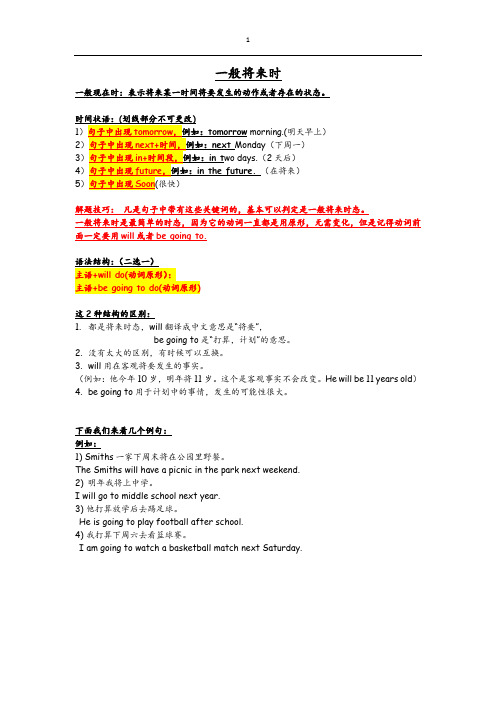
一般将来时一般现在时:表示将来某一时间将要发生的动作或者存在的状态。
明天早上)(下周一)2天后)解题技巧:凡是句子中带有这些关键词的,基本可以判定是一般将来时态。
一般将来时是最简单的时态,因为它的动词一直都是用原形,无需变化,但是记得动词前面一定要用will或者be going to.语法结构:(二选一)主语+will do(动词原形):主语+be going to do(动词原形)这2种结构的区别:1.都是将来时态,will翻译成中文意思是“将要”,be going to是“打算,计划”的意思。
2.没有太大的区别,有时候可以互换。
3.will用在客观将要发生的事实。
(例如:他今年10岁,明年将11岁。
这个是客观事实不会改变。
He will be 11 years old)4.be going to用于计划中的事情,发生的可能性很大。
下面我们来看几个例句:例如:1) Smiths一家下周末将在公园里野餐。
The Smiths will have a picnic in the park next weekend.2) 明年我将上中学。
I will go to middle school next year.3)他打算放学后去踢足球。
He is going to play football after school.4)我打算下周六去看篮球赛。
I am going to watch a basketball match next Saturday.练习题:一、请翻译下列句子:1)Helen打算放学后走路回家。
2)Ben打算下周日去图书馆看书。
3)Mike明天晚上将要参加Kim的生日派对。
4)他打算下周六打扫房子。
5)你明年打算做什么?6)Tom下个月将不在这里工作。
7)下个月将是植树节,李明打算和父母亲一起去植树。
8)妈妈打算端午节的时候做一些粽子,我希望你能来和我们分享一些。
9)我们十月份将去参观长城。
